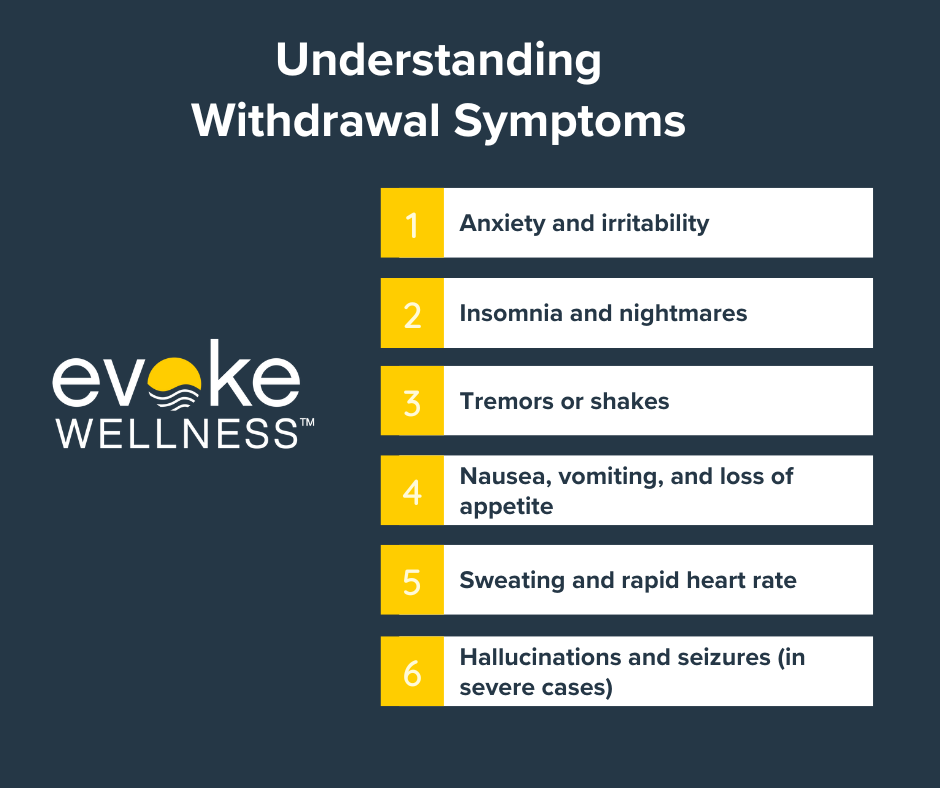Are you or a loved one struggling with alcohol addiction? Understanding alcohol withdrawal is crucial for those seeking recovery. This complex process occurs when heavy drinkers suddenly stop or significantly reduce their alcohol consumption. Recent studies show that up to 50% of people with alcohol use disorder experience withdrawal symptoms. These can range from mild anxiety to severe complications like delirium tremens. In this article, we’ll explore the symptoms of alcohol withdrawal and discuss effective treatment options, including residential programs, therapy, and dual diagnosis approaches. By gaining knowledge about withdrawal, you’ll be better prepared to navigate the path to sobriety and long-term recovery.
If you or a loved one is struggling, help is available today. Call (833) 969-3318 to speak with our compassionate team, or reach out online and schedule an appointment to begin a healing journey.
What is Alcohol Withdrawal?
Alcohol withdrawal is a potentially life-threatening condition that occurs when someone who is physically dependent on alcohol suddenly stops or significantly reduces their intake. As the body becomes accustomed to the presence of alcohol, it requires increasing amounts to achieve the same effects, leading to dependence. When alcohol consumption is abruptly halted, the brain and body experience a shock, triggering a range of distressing and dangerous symptoms.
Withdrawal Symptoms
- Anxiety, irritability, and restlessness
- Tremors and sweating
- Nausea, vomiting, and loss of appetite
- Insomnia and disturbed sleep patterns
- Rapid heart rate and elevated blood pressure
- In severe cases, hallucinations, seizures, and delirium tremens (DTs)
DTs, a state of acute confusion and agitation, can be fatal without proper medical intervention. According to the National Institute on Alcohol Abuse and Alcoholism, about 5% of people undergoing alcohol withdrawal experience DTs.
Seeking Professional Help
Attempting to quit alcohol cold turkey without medical supervision can be extremely dangerous and even life-threatening. Evoke Wellness at Coconut Creek offers comprehensive inpatient alcohol rehab programs that provide a safe, medically-supervised environment for detoxification and withdrawal management.
Their experienced team of addiction specialists closely monitors each patient’s vital signs and administers medications to alleviate withdrawal symptoms and prevent complications. After stabilization, evidence-based therapies like cognitive-behavioral therapy and dialectical behavior therapy are employed to address the psychological and behavioral aspects of alcoholism, fostering long-term recovery.
What Happens When You Stop Drinking Alcohol?
Physical Withdrawal Symptoms
When you abruptly stop drinking alcohol after a period of heavy, chronic use, your body goes into withdrawal. Common physical symptoms include tremors, sweating, nausea, anxiety, and insomnia. In severe cases, life-threatening seizures and delirium tremens (DTs) can occur without medical supervision.
Alcohol depresses the central nervous system. With sudden abstinence, the brain becomes overexcited, leading to unpleasant physical effects as it tries to regain equilibrium.
Psychological Effects
Alcohol withdrawal also takes a psychological toll. Depressant drugs like alcohol disrupt the brain’s delicate chemical balance, potentially causing symptoms of depression, anxiety, irritability, and mood swings. Insomnia and nightmares are common.
In some cases, alcohol withdrawal can trigger psychosis, hallucinations, and paranoid thoughts – a temporary break from reality. This is why professional treatment is so crucial.
Need for Detox and Treatment
Given the severe physical and mental impacts, alcohol withdrawal is best managed through a supervised medical detox. At an accredited facility like Evoke Wellness, medications can ease withdrawal symptoms while keeping patients safe and comfortable.
Detox is just the first step. Inpatient or outpatient rehab addresses the root psychological causes of alcoholism through therapy, counseling, and holistic care. This comprehensive approach gives patients their best chance at achieving lasting sobriety.
What are the Symptoms of Alcohol Withdrawal Syndrome?
Physical Withdrawal Signs
When you quit drinking after prolonged alcohol abuse, your brain’s chemistry gets disrupted. This can trigger a range of physical symptoms as your body struggles to readjust. Common signs include:
- Nausea, vomiting, and stomach cramps
- Profuse sweating and rapid heart rate
- Tremors or uncontrolled shaking
- Headaches and insomnia
- Fever and paleness
These withdrawal effects usually start within 8 hours after the last drink and peak around 24-72 hours. In severe cases, alcohol withdrawal can lead to life-threatening delirium tremens without proper medical care.
Psychological Symptoms
Beyond the physical impact, alcohol withdrawal also takes a toll on mental well-being. You may experience intense mood swings, anxiety, depression, irritability, and fatigue. Some psychological effects include:
- Feeling restless, on-edge, or disoriented
- Difficulty thinking clearly or concentrating
- Heightened sensitivity to light and sound
- Nightmares or disturbing dreams
- In extreme cases, hallucinations or seizures
Psychological symptoms can persist for weeks or months after quitting alcohol, underscoring the need for comprehensive therapy and support.
Withdrawal Timeline
The intensity of alcohol withdrawal symptoms typically follows this general timeline:
- 6-12 hours: Minor symptoms like anxiety, insomnia, and stomach upset
- 12-24 hours: Symptoms significantly worsen and may include shaking, sweating, and confusion
- 48-72 hours: Symptoms peak and delirium tremens may develop in severe cases
- 5-7 days: Most acute physical symptoms gradually subside
- Weeks/months: Psychological symptoms like mood swings and sleep issues can linger
Withdrawal severity depends on factors like drinking history, age, overall health, and whether medical help is received. Seeking professional addiction treatment is crucial for overcoming alcohol dependence safely.
How is Alcohol Withdrawal Syndrome Diagnosed?
Physical Evaluation
If you’re exhibiting symptoms of alcohol withdrawal, your doctor will perform a comprehensive physical evaluation to assess your condition. This typically includes checking vital signs like blood pressure, heart rate, and body temperature, as well as evaluating any visible signs of distress or tremors. They may also order blood tests to check liver function and electrolyte levels, which can be impacted by heavy alcohol use.
Assessment Tools
Medical professionals often use standardized assessment tools to diagnose alcohol withdrawal syndrome and determine its severity. One commonly used tool is the Clinical Institute Withdrawal Assessment for Alcohol (CIWA-Ar), which evaluates symptoms like nausea, tremors, agitation, and disorientation on a numerical scale.
Monitoring and Observation
In many cases, individuals experiencing alcohol withdrawal will be closely monitored in a medical setting, such as a hospital or rehabilitation facility. This allows healthcare professionals to track the progression of symptoms and intervene promptly if complications arise, particularly in cases of severe or life-threatening withdrawal. Continuous observation helps ensure the patient’s safety and guides appropriate treatment decisions.
Diagnostic Criteria
According to the Diagnostic and Statistical Manual of Mental Disorders (DSM-5), alcohol withdrawal syndrome is characterized by the cessation or reduction of heavy, prolonged alcohol use, followed by two or more of the following symptoms within several hours to a few days: autonomic hyperactivity (sweating, rapid heart rate), hand tremors, insomnia, nausea or vomiting, hallucinations or illusions, psychomotor agitation, anxiety, and generalized tonic-clonic seizures.
By combining physical examinations, assessment tools, monitoring, and the DSM-5 diagnostic criteria, healthcare professionals can accurately diagnose alcohol withdrawal syndrome and determine the appropriate course of treatment, which may include medication-assisted therapy, counseling, and support services to address both the physical and psychological aspects of addiction.
How is Alcohol Withdrawal Syndrome Treated?
Medically Supervised Detox
The first step in treating alcohol withdrawal syndrome is medically supervised detoxification. This allows the body to safely remove alcohol from the system while managing dangerous withdrawal symptoms like seizures, tremors, and delirium tremens under 24/7 medical care. Medications may be prescribed to reduce anxiety, prevent complications, and ease the discomfort of withdrawal. According to the source, alcohol detox is a critical first phase before beginning counseling and therapy.
Inpatient Rehab Program
Once stabilized through detox, patients transition into an inpatient alcohol rehab program. At Evoke Wellness Coconut Creek, this intensive treatment lasts 30 days to 3 months or longer, utilizing evidence-based therapies:
- Cognitive-Behavioral Therapy (CBT)
- Dialectical Behavior Therapy (DBT)
- Motivational Interviewing
- Holistic approaches like meditation and yoga
The program provides individual and group counseling, relapse prevention planning, dual diagnosis support if needed, and encourages participation in recovery groups.
Comprehensive, Personalized Care
Evoke programs are tailored to each patient’s needs, utilizing a range of behavioral therapies, psychiatric assessments, and medical support. This personalized, multifaceted approach addresses the physical and psychological aspects of alcohol addiction to support lasting recovery. Continued aftercare helps prevent relapse and maintain sobriety long-term.
What is Alcohol Withdrawal? FAQs
Understanding Withdrawal Symptoms
Alcohol withdrawal refers to the physical and psychological symptoms that occur when someone who is dependent on alcohol abruptly stops or significantly reduces their drinking. These symptoms can range from mild to severe and potentially life-threatening. Common withdrawal symptoms include:
When Do Symptoms Start?
Withdrawal symptoms typically begin within 6-12 hours after the last drink, peak around 24-72 hours, and can last up to 2 weeks. According to Stanford’s Human-Centered AI group, the timeline and severity depend on factors like the duration and amount of alcohol consumption, overall health, and any co-occurring medical or mental health conditions.
Why Seek Medical Help?
Attempting to quit alcohol “cold turkey” without proper medical supervision can be extremely dangerous. Severe withdrawal symptoms can be life-threatening, necessitating a medically-assisted detox at a professional treatment facility. Medications like benzodiazepines may be prescribed to manage symptoms and prevent complications.
Continuing Care for Recovery
After completing detox, comprehensive addiction treatment is crucial for long-term recovery. Evidence-based therapies, such as cognitive-behavioral therapy (CBT), individual/group counseling, and relapse prevention strategies, address the psychological aspects of alcohol use disorder. Ongoing aftercare services like alumni support groups and individual counseling help maintain sobriety.
Conclusion
In conclusion, alcohol withdrawal is a serious condition that requires professional medical attention. By understanding the symptoms and available treatment options, you can take the first step towards recovery. Remember that seeking help is a sign of strength, not weakness. Whether through a residential treatment program, therapy, or dual diagnosis treatment, there are proven paths to overcome alcohol addiction. Recent studies show that comprehensive treatment approaches can increase long-term sobriety rates by up to 60%. Don’t face this challenge alone – reach out to a qualified treatment center today to begin your journey to a healthier, alcohol-free life. Your future self will thank you for taking this courageous step towards lasting recovery and well-being.
Begin Your Journey With Evoke Wellness at Coconut Creek
Evoke Wellness at Coconut Creek is a full-service addiction treatment facility serving Florida residents. We base each of our programs on the individual’s severity of symptoms and use a combination of evidence-based therapies and holistic approaches to address the needs and recovery goals of the patient.
If you or a loved one is struggling, help is available today. Call (833) 969-3318 to speak with our compassionate team, or reach out online and schedule an appointment to begin a healing journey.



